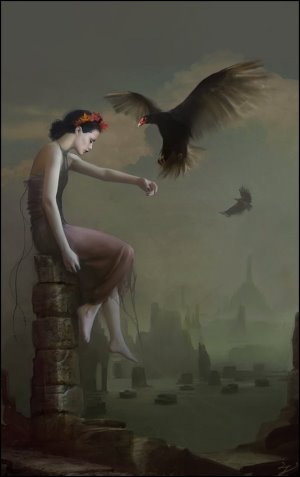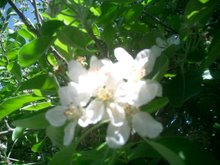
In the early mornings sun, the trees, the river and the streets are basking. The night still lingers in corners and alleys, while the day's warmth fills the world with rushing life. A butterfly awakes from its slumber in the grass, and opens its wings to let the sun dry the dewdrops. The wind chases through the new leafs of the trees, producing the noise of rustling fine silk robes. The sound of running, stealthily, through a distant garden gate, in rustling fine silk robes. In an age long past it was, this running to that gate. Even then this gate was ancient, green with moss, a creeper draped over, with little white flowers on spring mornings. The gate is set in a thick brick wall, that seems to rise all the way up to the clear mornings sky. In this enclosure of numbness, a girl sits staring. Underneath the apple blossoms, next to the first roses, in the finest silken robes, she sits on a chair, on the grass, in the sun.
Why doesn't she cry. This painted picture of a long forgotten age does not seem complete without her tears to break the mornings light. Unhappiness has left her, along with all other -nesses. Her suffering is like her pleasure. Soft as a feather, and therefore unable to produce neither tear nor heartbeat. She has been sitting in her gold-cage-garden since the earth was new. Is she just a girl? Maybe she is a nymph, an apsara, a goddess? Who is to say? It is intrinsic to life itself that every creature thinks itself special, different, chosen. Divinity is in our heads. And if we all think ourselves gods, who is there to claim otherwise. So to know whether she is a nymph, an apsara, or a goddess, we have to know which one of these she is in her thoughts. Can we know that? Can we know what the girl in the enclosed garden in long lost times thinks? Yes we can, for this is a story, and storytellers have special powers.
Once, before time, she was a nymph. She did see moons rise above the ocean, and golden fields in autumn. Her feet know the touch of grass, her lips have felt what it is like to smile, she has known that will and love make blood rush faster. That was, however, long ago. The world has now grown old. And sitting in the garden, she forgot. Once she was a nymph.
But now, on the chair, next to the rosebush, she is empty. That most human ability, intrinsic of life, has left her. No longer does the blood rush through her veins; it has become almost stagnant for loss of will to power it. In her head, she is just she. A vile condition indeed.
Why is she there? Is someone keeping her prisoner? Who could it be? Her evil father or stepmother perhaps? How closed is that old gate, at the back of the garden? Is it locked? Have the creepers entangled it securely through the ages? And how securely is securely? It doesn't matter now. She does not feel anymore. Nothing. Empty. Her blood, ever slowing from the beginning of times has almost stopped completely now. The sun is sinking, turning the garden into a red and golden palace hall, worthy of a nymph, an apsara or a goddess. She sees, but doesn't feel it. A creaking noise makes her hollow eyes turn.
Times end. They can’t go on forever. The world becomes old. It has to come to a close, for otherwise, it might loose the ability of beginning.
The God of the End, radiantly beautiful, strong and young, stands in the garden, at the gates. He calls her by the name she had forgotten. She stands, for the first time in eras, and goes to him, her robes, finest silk of course; rustle through the grass. With the fires in his eyes, he rekindles hers. “O beauty from the olden days, you shine like the millions of stars that have burned out since last I came ‘round here. Do you not know, the world and times, they are ending?”
Life, the long caged creature, creeps uncertain to the gates of its enclosure. Open. Open your wings, o life, my love, and fly. So returns, first the memory of wind beneath wings, then the blush to her cheeks, the divine to her thoughts, the tears to her eyes.
"If all things are to end, if this indeed is the end of times, O wondrous maiden, star-eyed nymph, wilst thou walk with me along the borders of old forests and on the banks of rivers that bear the echoes of past ages, so that the end has some beginning in it too?"
Quote the raven: "Evermore."




1 opmerking:
't Is prachtig. Waar wacht je op om een boek te schrijven? Als ik half zo goed was, dan was ik nu mijn tweede boek aan het schrijven.
Meer van dattum zou ik zeggen.
Een reactie posten